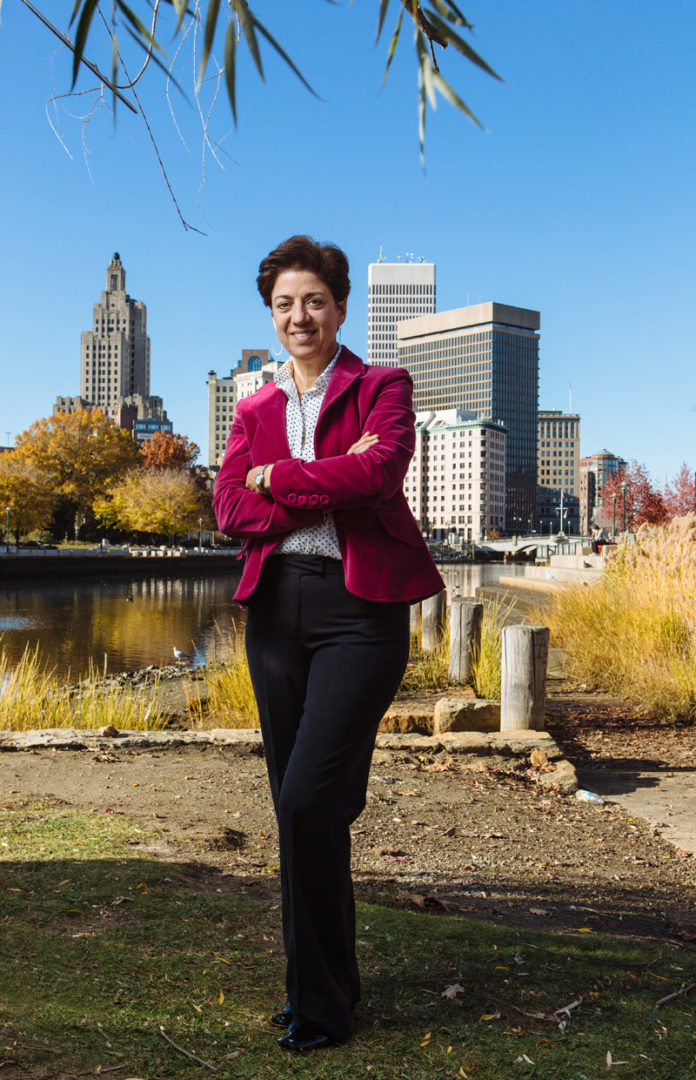
Maria Tocco is founder and market manager of Providence Flea LLC, a weekly outdoor marketplace where crafts makers and collectors show and sell their juried wares to treasure hunters, up-cyclers and collectors of vintage and repurposed goods. In 2016, its fourth year, it expanded to include a fall season after moving to a parcel on the former Interstate 195 land.
What are the biggest hurdles to starting a business in Rhode Island?
For many people looking to break out on their own, it is knowing where to start. Personally, I’ve benefited from having developed many helpful contacts in state and city government over the course of my career who have pointed me in the right direction. I’ve also taken advantage of the free counsel and some of the resources offered by … the Center for Women & Enterprise.
Does Rhode Island have the resources to help companies develop innovative products and services?
Rhode Island absolutely has the resources to help companies innovate and thrive, and I think we’re seeing an unprecedented level of coordination and civic engagement in the state to get our stalled economy really moving again. For example, we have a reconfigured state commerce corporation, a new entrepreneurship center at Brown University, innovation fellowships offered by the state and by the Rhode Island Foundation, Goldman Sachs’ 10,000 Small Businesses program and, perhaps most important, a competitive strategy developed for the state by the Brookings Institution. Add to these considerable efforts our existing resources and assets – such as our proximity to Boston and New York, and Rhode Island’s beautiful natural resources and high quality of life – and you definitely have the ingredients and the recipe for success.
What industry offers the greatest potential for growth through innovation in R.I. and why?
Biotech has yielded great returns in Massachusetts, and I think we look to Massachusetts for their success with the Miracle Mile and how they built the tech corridor. I would like to see attention paid to other areas as well. Rhode Island excels in the food industry. That would be a natural fit, especially with Johnson & Wales University, a renowned culinary program here in Rhode Island. Our chefs are also winning awards and distinctions. We have food-business incubators [such as] Hope & Main that offer businesses counsel and the use of their commercial kitchens.
Have state and city governments and regulatory mechanisms been helpful in getting your idea off the ground?
I don’t think I experienced many obstacles, but it was a tremendous coordination effort in getting it together. There were a lot of different offices and departments that I had to be in touch with. I was impressed by how helpful the city was. It wanted to ensure I had a successful event.
How could state and local governments be more helpful to innovators?
We are emerging from the recession more slowly than other states that are larger, with more diverse industries. We will see the fruits of those labors, but that change doesn’t happen overnight. … It seems now that everyone is rowing in the same direction.
How did you come up with the idea for Providence Flea? How did you see its potential?
I’m a huge fan of the Brooklyn Flea, and after my very first visit in 2011, I knew I wanted to have this same event in Providence somehow – to be able to attend it even more so than to run it. I loved the market’s atmosphere and could see that we shared a lot of similarities with Brooklyn and its thriving “maker” scene. People are responding to the struggling economy by striking out on their own to pursue their passion. It felt to me like the best of everything I love in one, and I wanted to be a part of it.
What are your plans for the Flea in the future?
We would love to find an indoor location where we can go year-round because it is growing exponentially. The market has shown annual growth of more than 25 percent a year. We hosted over 300 vendors in the outdoor season, and more than 90 percent of them were locals. •










